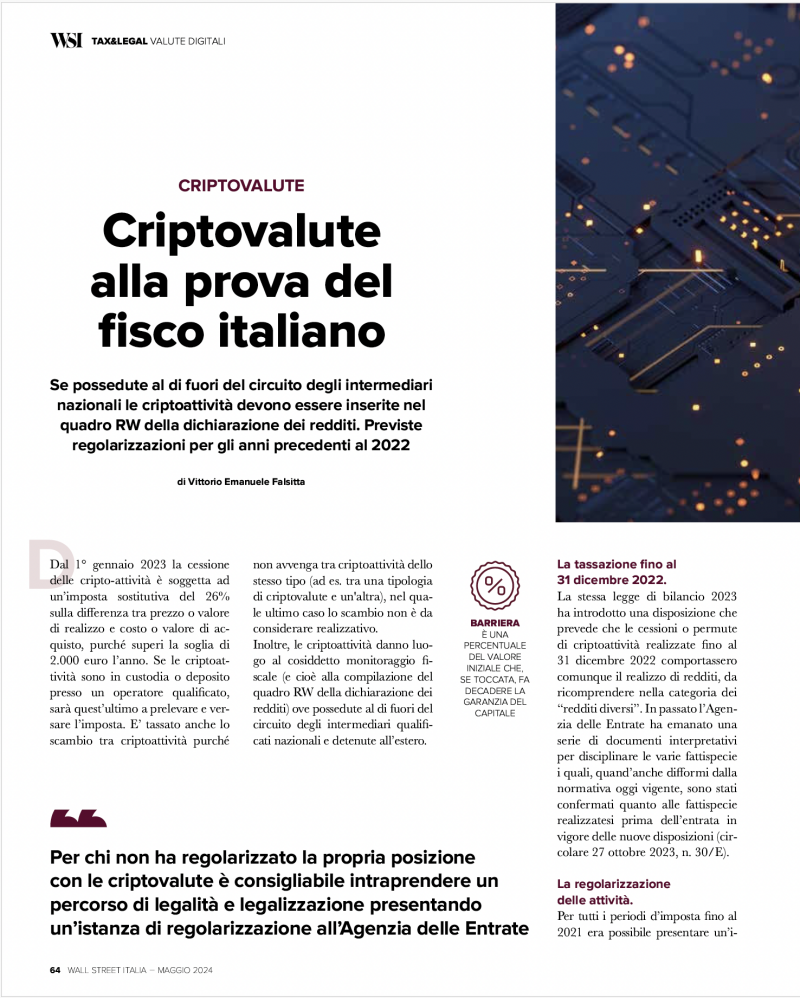
Wall Street Italia magazine published an in-depth article by V.E. Falsitta on the tax processing of cryptocurrencies in our country.
As of 1 January 2023, the assignment of crypto assets is subject to a 26% substitute tax on the difference between the realisable price or value and acquisition cost or value, provided it exceeds the threshold of 2,000 euro per year. If the crypto assets are in safekeeping or deposited with a qualified trader, the latter will collect and pay the tax. Exchange between crypto assets is also taxed provided it does not take place between cryptocurrencies of the same type (e.g. between one type of cryptocurrency and another), in which case the exchange is not to be considered achievable. In addition, crypto assets give rise to so-called tax monitoring (i.e. filling in the RW box of the tax return) when kept outside the network of domestic qualified intermediaries and held abroad.
Taxation until 31 December 2022
The 2023 Budget Law itself introduced a provision stipulating that sales or exchanges of crypto assets made up to 31 December 2022 would still entail the realisation of income, to be included in the category of "miscellaneous income". In the past, the Revenue Agency issued a series of interpretative documents to regulate the various cases, which, even if they differed from the regulations in force today, were confirmed insofar as they applied to cases that occurred before the new provisions came into force (Circular No. 30/E of 27 October 2023).
The regularisation of activities
For all tax periods up to 2021, it was possible to file a regularisation application for assets held in crypto assets, paying an amount of 0.50% of their annual value to rectify violations of the obligation to fill out the RW return. By contrast, this amount was 4% if the crypto assets produced capital gains as a result of their transfer. In addition, until 15 November 2023, it was possible to "release" the value of crypto assets still held on 1 January 2023 with a 14% substitute tax. Many taxpayers have neither "regularised" nor "released" their crypto assets. There are obvious critical issues linked to the "opacity" of the legislation itself with reference to the past, to the "percentage" of regularisation, to the fact that it was based on values that were sometimes not current (e.g. on 31 December 2021 bitcoin had a very high value), to the fact that regularisation at 4% per annum was "lump-sum" in order to allow the same outlay for those who had made one or a few transactions and for those who had made thousands of transactions for speculative purposes, and to the fact that the 14% revaluation was not recognised in order to offset any capital losses.
And for those who have not regularised?
It is advisable to embark on a path of legality and legalisation (not only for tax purposes) of crypto assets. Our recommendation is to submit a request for legalisation and regularisation to the Revenue Agency in which, after demonstrating the origin of the assets invested in crypto assets – so that any element of suspicion of money laundering is eliminated – all the information is provided in order to reach a solution for taxation, one that is preferably analytical in cases where the data and elements allow it, and with possible simplifications and lump-sums in cases where the realisation of values is questionable (think of exchanges between cryptocurrencies) or difficult to quantify. With the collaboration of the tax offices, in the case of an assessment with agreement for past tax periods (or, possibly, a voluntary settlement), it is possible to achieve fairer levels of taxation, since it is targeted at the actual events that took place. This is also because such a "virtuous" path, which passes through a prior analysis of their assets, may be more in keeping with the taxpayer's "experience" in the face of taxation consequences – which could potentially be considered criminal – accrued in a context of regulatory uncertainty.
